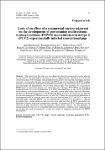Lack of an effect of a commercial vaccine adjuvant on the development of postweaning multisystemic wasting syndrome (PMWS) in porcine circovirus type 2 (PCV2) experimentally infected conventional pigs
Resendes, Ana
Segalés, Joaquim
Balasch, Mònica
Calsamiglia, Maria
Sibila, Marina
Ellerbrok, Heinz
Mateu, Enric
Plana-Durán, Joan
Mankertz, Annette
Domingo, Mariano
The objective of this study was to evaluate the effect of a commercial vaccine adjuvant on the clinical and pathological outcome of PCV2 experimentally infected 8 to 9-week-old conventional pigs. Forty-four pigs were divided into four groups: non-infected control pigs, pigs that received a vaccine adjuvant, pigs inoculated with PCV2, and pigs inoculated with PCV2 together with the vaccine adjuvant. Infection was monitored until 69 days post-inoculation (PI). Some PCV2 inoculated pigs had hyperthermia, but no other clinical signs were recorded. No characteristic PMWS gross or microscopic lesions were observed in any of the pigs. PCV2 DNA was detected in lymphoid tissues by in situ hybridisation in 6 PCV2 inoculated pigs on day 69 PI. All PCV2 inoculated pigs seroconverted between days 21 and 49 PI, shortly after viremia detection. Moreover, viremia was detected between days 7 and 69 PI using PCR. A peak of the virus load was detected by real-time quantitative PCR between days 14 and 21 PI. There were no significant differences in the proportion of PCV2 positive serum and in the viral load between PCV2 and PCV2 + adjuvant inoculated pigs. Although PMWS was not reproduced in neither PCV2 nor PCV2 + adjuvant inoculated pigs, viremia detection and seroconversion indicated that all PCV2 inoculated pigs developed a chronic long-term asymptomatic infection. An increase of PCV2 replication was not observed in pigs inoculated with the adjuvant. These results indicate that the principle of immunostimulation may not be applicable under the experimental conditions used, suggesting that not all adjuvants used in commercial vaccines are capable of triggering mechanisms for PMWS development.
No license information

